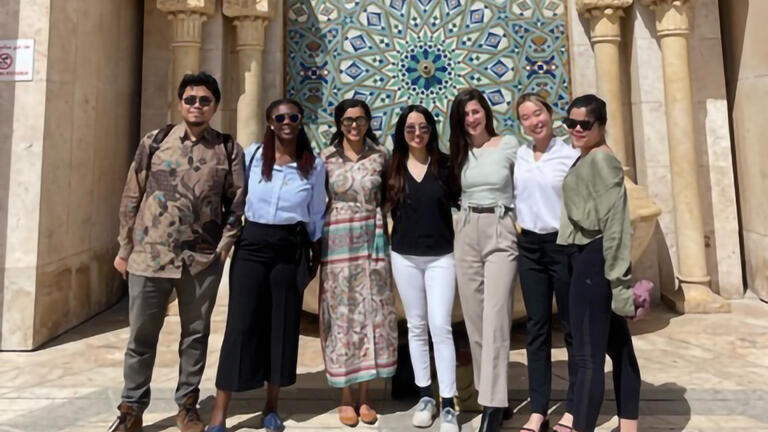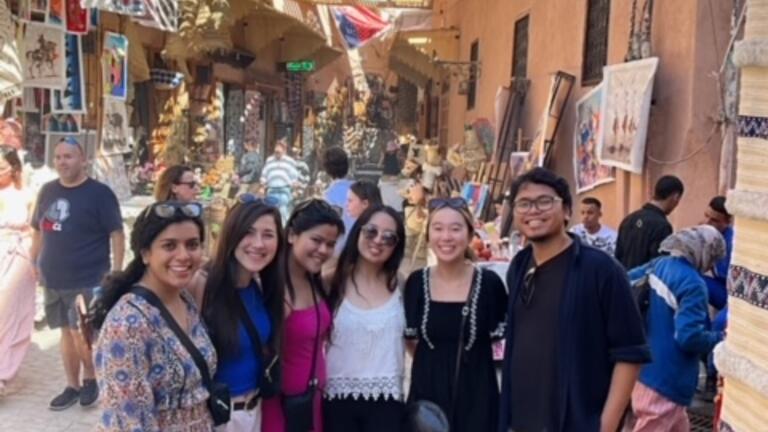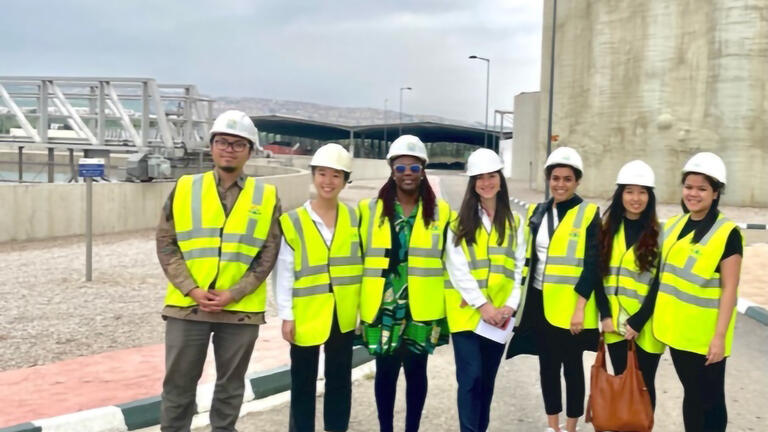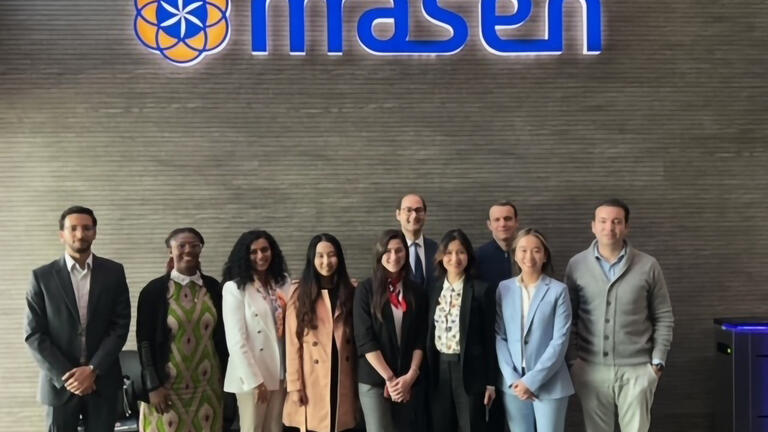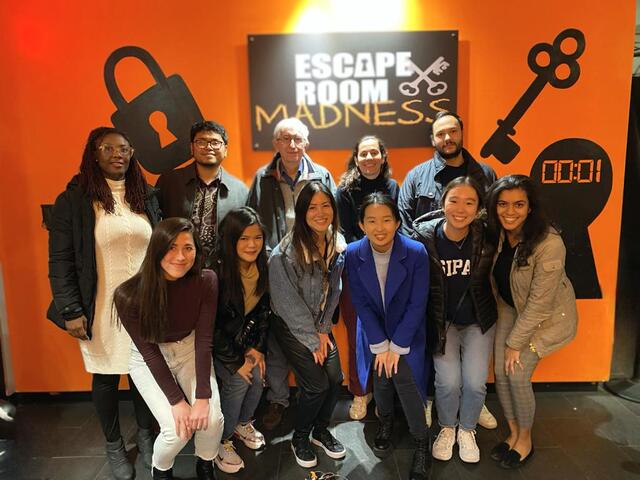
The Trials and Tribulations of a Very Memorable (and Rewarding) SIPA Capstone Project
Note from the editor: Clara submitted this blog prior to SIPA's Class Day Commencement on May 14th. At Commencement, her capstone group was recognized and awarded the "Isaac Anderson Rauch Award for Excellence in a Capstone Project." This winning team and project are selected on the basis of analytical rigor, quality of final deliverables, and potential impact. Congratulations to Clara and her team for their capstone on "Investing in Waste-to-Energy Technologies to Meet Nigeria's Growing Waste Challenges"
One of the reasons I chose SIPA is because the curriculum intentionally builds in time for students to leverage and complement their concentration/specialization knowledge with applied projects. One of the culminating experiences of the degree is the Capstone Workshop. Usually, completed during the last semester of the program, students will work in teams of 6-8 students under a faculty advisor to complete a consulting project.
SIPA establishes relationships with high-profile external clients, ranging from multilateral organizations, government agencies, financial institutions, to non-profit organizations, to formulate projects that meet students’ interests. The final deliverables vary per project, but the goal is to provide the client with innovative and actionable recommendations for the proposed research question. Check out a list of previous projects and clients!
So how does this process work? During the fall semester of your second year, you will receive a list of all Capstone Workshops. Since the projects can have domestic and international clients, there are around 25% of projects that include international travel. Given that I wanted to incorporate as much international travel during my two years at SIPA as possible, I only ranked projects that incorporated travel. Based on the client, project description, and scope, you will rank your top 5 choices through an application process. This process entails writing a few paragraphs on why you are interested in each project, what skill sets you contribute, and how the project will contribute to your goals.
My project was in collaboration with the Nigeria Sovereign Investment Authority (NSIA), an independent government institution funded by Nigeria’s excess oil revenues. It currently manages around $2.1 billion in assets and is a key public actor in the country’s economic development and advancement of its climate goals. Our project was unique because we had two LL.M. degree students from the Law School and 7 SIPA students from the Energy and Environment and International Finance and Economic Policy concentrations (below: team photo from a team building exercise). Our lead advisor is a prolific lawyer with an expertise in extractive industries and renewable energy. She has over a decade of experience in high profile infrastructure transactions, focusing on negotiating and structuring complex legal and commercial deals internationally. She is also a former government advisor specializing in infrastructure development, risk assessments in challenging environments, and environmental and social impact assessments, to name a few.

Though the advisor selected the members of our team, I was lucky enough to be in a group of students that I knew well and, for those that I didn’t, I knew they had a strong work ethic. This combination ended up being critical because of the obstacles we were soon to face as a group.
Originally, our project topic was to provide investment recommendations for how the NSIA could tap into the rapid growth in the liquefied petroleum gas (LPG) market and to create a business model to facilitate the implementation of clean cooking in households. This project was particularly relevant because of the high growth rate in LPG supply in Nigeria and the low utilization of LPG in households for cooking. Currently, the majority of the population uses kerosene or biomass for cooking and generating energy at home; this causes harmful indoor air pollution and contributes to carbon emissions.
However, upon the start of the project, the topic pivoted, instead, to tackling the country’s waste management challenges. This transition occurred because the organization determined that, based on its resources and mandate, it had a greater opportunity to make an impact in this sector. Our team quickly worked to shift our expectations around what our project was going to look like this semester and conducted background research to become more familiar with this issue area. In addition to needing to develop expertise in a new area under a tight timeframe, our team also had to collaborate with our advisor and client to define a completely new project scope. The latter was particularly challenging because we had to establish a narrow scope that fit within the rapidly progressing semester, would add value for the client, and was an area that we were passionate about.
After countless hours of research, whiteboarding, and brainstorming, we whittled our topic from waste management down to waste-to-energy (WtE) technologies around municipal solid waste. Our aim was to devise a bankable and scalable investment strategy around WtE that also had a positive nationwide impact. However, just as we were settling into our new topic and advancing along with our stakeholder interviews, we hit another major curveball regarding our travel plans.
Originally, we planned to travel to Abuja and Lagos during our spring break to conduct field research and to meet with our client. Considering delays in defining and hitting the ground running with our new topic, connecting with key stakeholders in-country was even more critical. However, with the country’s presidential election and university concerns around post-election protests, we were unable to travel. With the evolving nature of the political reality, the decision to not approve our travel came less than two weeks before we intended to depart.
Despite this outcome, our team was committed to completing field research, within the continent, that would allow us to recommend best practices to our client. One of our stakeholder interviews was with a Columbia Engineering professor and he connected us with a WtE expert in Morocco. Though we knew it was a long shot, we managed to quickly connect with him over a call, explain our travel situation, and pitch a collaboration where we come to Morocco to continue our research. To our luck, he was very gracious with his time and offered to help connect us with ministries, non-profits, and private sector actors that would be relevant to our project. On top of that, he offered to share his knowledge around how these findings could apply to the Nigerian context and help us prepare for these interviews.
Within 72 hours of us connecting with him, our team pulled together a comprehensive memo of why we should receive funding to travel to Morocco instead, outline a tentative interview schedule; we, ultimately, managed to receive SIPA’s approval to travel. Below are some pictures from the most spontaneous trip I have been on!
Despite all of these challenges, our team not only recommended key WtE technologies the NSIA should invest in and further explore, but also provided a comprehensive financial model that the NSIA can use to test inputs and scenarios for WtE projects of different sizes. I’m grateful for our team and advisors that created an environment that valued transparency and communication and for a client that remained flexible and provided strong feedback throughout the process. Our team was also awarded The Isaac Anderson Rauch Award for Excellence in a Capstone Project, which is an annual award given to the student team that has produced the best overall Capstone workshop project. What a way to round off our SIPA experience and our team's incredible journey.
